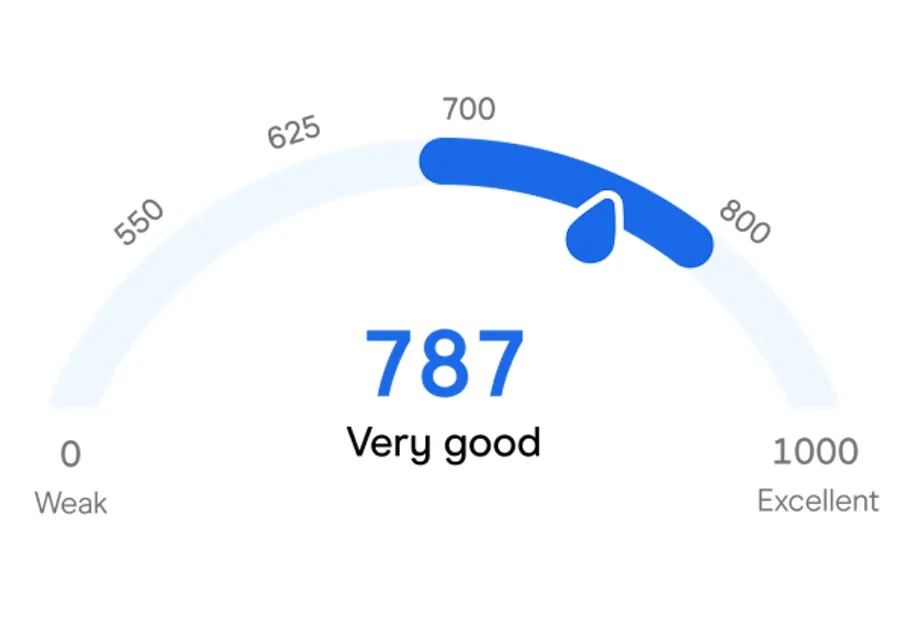How to improve your credit score
Follow these 9 steps and you'll increase your credit score in no time:
- Check your credit score
- Challenge any errors on your credit report
- Pay off late payments or defaults
- Make regular repayments on your existing debts
- Pay your bills on time
- Lower the limit on your credit card
- Avoid multiple debts, especially high interest ones
- Avoid applying for too many credit products at once
- Watch out for buy now pay later
1. Check your credit score
You can't improve your credit score if you don't know what it is.
You can check your credit score by going to the Score tab in your Finder app. You'll be able to view your current score and can also see your entire credit report by tapping "View your credit report".
If you haven't yet applied for your credit score, you can do so by heading to the Home tab and tapping "Get my credit score".

Along with the score you'll get your credit report, which contains:
- A 24-month history of your loan repayments, including late payments or defaults.
- Information about your credit accounts (loans and credit cards).
- Any enquiries or requests made by lenders for your credit report in the last 5 years.
- Any bankruptcies or court judgements in your name.
Once you have your credit score you can identify the best ways to increase it.
2. Challenge any errors in your credit report
Look at the details contained in your credit report. If it all looks accurate, then jump to step 3. But if you find any errors you can get them corrected and your credit score should increase pretty quickly.
Here are some examples of possible errors:
- Incorrect personal information
- Incorrect missed payments or defaults
- An unpaid debt you were never notified about
- Enquiries made on your behalf for credit you never applied for
You can request a correction on your credit report through the agency that issued the report. And you can contact the credit provider that made the mistake directly.
You'll need some personal identification, plus the report, the specific detail you're challenging and evidence of the error.
3. Pay off late payments and defaults
You should fix the biggest issues dragging your credit score down as soon as possible. Red marks on your credit report are usually:
- Missed payments. If you've missed a payment on a bill by more than 14 days it is recorded on your credit report for 2 years.
- Defaults. If a repayment is more than 60 days overdue and the amount is $150 or more, a default is recorded in your credit report. Defaults stay on your report for 5 years.
Prioritise paying off any outstanding debts, especially a default. Make sure you pay any missed payments before the 14 days if possible.
Paying off an outstanding payment looks better on your credit report but the missed payment or default is still recorded.
4. Make regular repayments on your debts
It sounds obvious but don't miss a payment on your credit card or loan. Pay off at least the minimum on your credit card before it's due.
🔥 Hot tip
Set up direct debits so payments are made automatically. Just make sure you have money in the bank account to cover the payment.
Good credit means going into debt
You might think someone who has never had a cent of debt to their name would have a perfect credit score. But that's not the case.
To prove you are a reliable borrower you need to actually have a history of managing debt responsibly.
If you've never had a loan or credit card before it can be hard to show this. So you might actually be better off applying for a credit card with your bank as a first step.
Just make sure:
- You keep the credit limit low
- You actually use the card to buy things
- You make regular repayments on time
- The card has low fees
5. Pay your bills on time
Unfortunately your credit report doesn't record all the years you've spent paying your phone, internet, electricity and gas bills on time. Bills are not credit.
But if you've missed a bill payment by more than 14 days it will negatively affect your score.
So make sure you pay your bills on time. Setting up direct debits for your bills is the easiest way to do this.
6. Lower the limit on your credit card
If you already have a credit card and you're making repayments on time, you can further improve your credit score by lowering the card limit.
That's the maximum amount you can spend using the card. It's much easier to get into financial trouble with a card that lets you spend $6,000 versus one with a limit of $2,000.
If you don't need to make big purchases on your credit card, lower your limit.
7. Avoid multiple debts, especially high interest ones
A borrower with a single credit card and a home loan who never misses a repayment is likely to have a strong credit score.
But if you have 3 credit cards and 2 personal loans you'll struggle to improve your credit score even if you never miss a repayment.
If you can cut down to 1 or 2 credit cards and consolidate your loan debts you can lift your score.
Alternatively, prioritising paying off one of the loans completely would help too. A balance transfer credit card can be the best way to roll card debts into one manageable debt.
8. Avoid applying for too many credit products at once
When you apply for a loan or credit card the lender requests a copy of your credit report. This is called a hard inquiry and it can negatively affect your report.
This is because multiple applications for credit in a short time are considered a bad sign.
To avoid this:
- Don't apply for multiple debts at once
- Apply for a single credit product from a single provider
- Make sure your application is completed correctly and that you're eligible for the product before you apply
🔥 Hot tip
Getting rejected for a credit application hurts your credit score because of the hard inquiry mentioned above. Avoid applying for another credit product until you understand why you got rejected for the first one. Multiple inquiries can harm your credit score even more.
Checking your own credit score is considered a soft inquiry and doesn't affect the score in any way.
9. Watch out for buy now pay later
Buy now pay later (BNPL) products like Afterpay might not seem like credit products. But using BNPL can harm your credit score.
Missing BNPL repayments will hurt your credit score. And some BNPL providers make a credit enquiry when you sign up, meaning the company takes a look at your credit report. This can impact your credit score too.
More useful tips to get a better credit score
Time heals all credit wounds
If you've had a very bad run with your finances – missed payments, defaults, a bankruptcy – then time is your friend.
In Australia, defaults stay on your credit report for 5 years. Missed payments stay for 2. If you were declared bankrupt, the bankruptcy stays on your report for 2 years from the end date or 5 years from the date you became bankrupt (whichever of the 2 is later).
So while all the tips we've outlined above are very useful, for people with terrible credit the passage of time also helps a lot. Just avoid getting into more credit trouble in the meantime.
Credit repair companies
There may be mistakes on your credit report you can fix. And there are companies that offer credit repair services who can fix those for you.
But these companies can charge high fees and are often just doing things you can easily fix yourself, for free.
Keep a good credit card
Paying off debts completely is good financial advice. But it's often worth keeping a credit card you rarely use and have always paid off on time. This card is a good example of your creditworthiness.
Just make sure you keep the limit as low as possible.
Get help
If you're struggling to make repayments and need financial help you have options:
- Talk to your utility and credit providers. Before you miss a payment talk to your providers. They have hardship support schemes and payment plans available for customers.
- Get free financial counselling. The National Debt Helpline has free financial counsellors you can speak to on 1800 007 007.
Is there a quick way to improve my credit score?
In short, there's no super-quick fix for your credit score – repairing a low credit takes time. But it's not impossible.
Don't rely on any credit repair companies that promise to have black marks removed from your report as quick-fix efforts are most likely to backfire. Advice that claims to instantly fix your credit history should not be trusted.
The best thing to do is follow the steps above and be consistent over time. You could be surprised at how quickly your score improves after a few tweaks to your financial behaviour. Be patient, disciplined, and keep checking your score to stay on track.

